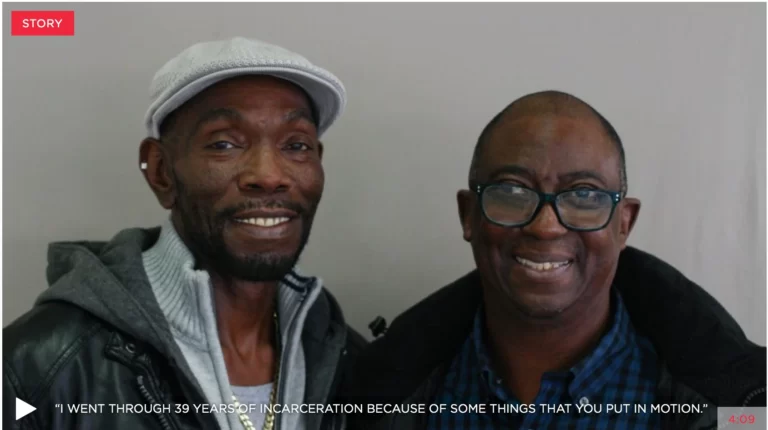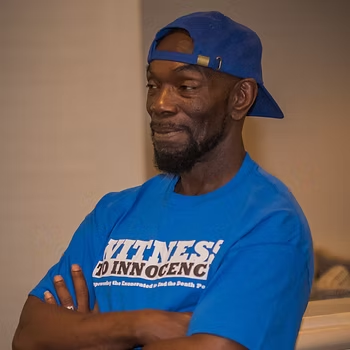
Page Description
Wrongfully imprisoned for nearly 40 years, Rickey Jackson’s story reveals how false testimony and police misconduct destroyed an innocent man’s life.
At just 18 years old, Rickey Jackson was sentenced to life in prison — based not on hard evidence, but on the coerced testimony of a 12-year-old boy.
There was no physical evidence, no murder weapon, and no clear motive — only circumstantial claims and a frightened child pressured by police. That child was Eddie Vernon, who later suffered deeply from the weight of his false testimony. Years later, while seriously ill in hospital, Eddie confided in a pastor: he had lied.
This revelation opened the door to Rickey’s eventual exoneration — after nearly 40 years of wrongful imprisonment.
On this page, we share the powerful story of Rickey Jackson and the emotional moment he met the man whose words once condemned him.
Op slechts 18-jarige leeftijd werd Rickey Jackson veroordeeld tot een levenslange gevangenisstraf — niet op basis van hard bewijs, maar op de afgedwongen getuigenis van een 12-jarige jongen.
Er was geen fysiek bewijs, geen moordwapen, geen duidelijk motief — alleen indirecte aanwijzingen en een kind dat onder druk van de politie een valse verklaring aflegde. Die jongen was Eddie Vernon, die later zwaar zou lijden onder het gewicht van zijn woorden.
Jaren later, terwijl hij ernstig ziek in het ziekenhuis lag, vertrouwde Eddie een dominee toe dat hij had gelogen.
Die bekentenis opende de deur naar Rickey’s uiteindelijke vrijspraak — na bijna 40 jaar onterechte opsluiting.
Op deze pagina delen we het aangrijpende verhaal van Rickey Jackson en het emotionele moment waarop hij de man ontmoette die hem ooit had beschuldigd.
A Deeper Look into our Justice System | Mark Godsey | TEDxUCincinnati
22 mei 2017
Mark Godsey has dedicated his legal career to protecting convicted inmates who claim they are not guilty. But how do those innocent citizens end up with convictions in the first place? Mark Godsey presents why that happens and how can we minimize—or even eliminate—the high number of wrongful convictions that happen in the United States each year.
Professor Mark Godsey directs the Ohio Innocence Project at the University of Cincinnati College of Law, and is a leading activist globally in the innocence movement. He is the author of Blind Injustice: A Former Prosecutor Exposes the the Psychology and Politics of Wrongful Convictions, forthcoming September 2017.
A Story of Injustice, Redemption — and Remarkable Courage
On May 19, 1975, a tragic robbery at a Cleveland grocery store ended in the murder of shopkeeper Harold Franks. What followed was a devastating miscarriage of justice.
Eighteen-year-old Rickey Jackson, who had nothing to do with the crime, was arrested and convicted—based solely on the testimony of a 12-year-old boy named Eddie Vernon. That boy had been pressured by police, overwhelmed by fear, and unaware of the weight his words would carry.
Rickey spent nearly four decades in prison for a crime he didn’t commit.
Years later, Eddie found the strength to come forward and admit the truth: Rickey was innocent. His courageous reversal paved the way for Rickey’s exoneration.
In this powerful StoryCorps conversation, Rickey and Eddie meet face-to-face to speak openly — not just about the past, but about the possibilities of healing, forgiveness, and what it means to reclaim a life taken by injustice.
This is more than a story of wrongful conviction — it’s a story of humanity, accountability, and the long road to truth.
What follows is the moment Rickey met Eddie — the man whose false words took his freedom. It is a meeting filled with emotion, pain, and a glimpse of something rarely seen in stories like this: the fragile beginning of truth and reconciliation.
🎥 Watch their extraordinary conversation.
Rickey’s case, like that of John Bunn, shows the brutal absurdity of police misconduct. A young man, completely innocent and with no connection to the crime, was torn from his life and locked away for decades — simply because someone needed to be blamed. These aren’t rare mistakes. They are catastrophic failures of justice, rooted in corruption and indifference.
It’s easy to say, “he was wrongly imprisoned for 38 years.”
But the truth is harder to grasp: the depth of anger, loss, and emotional devastation. Rickey spent his entire adult life behind bars. Eddie, too, suffered — haunted by guilt, depression, and the lifelong impact of being used by a system that cared more about a conviction than the truth.
Een verhaal over onrecht, verlossing — en opmerkelijke moed
Op 19 mei 1975 eindigde een gewapende overval op een kleine kruidenierswinkel in Cleveland in de tragische dood van winkelier Harold Franks. Wat daarna volgde, was een diepgaande gerechtelijke dwaling.
De 18-jarige Rickey Jackson, die niets met de misdaad te maken had, werd gearresteerd en veroordeeld — uitsluitend op basis van de getuigenis van een 12-jarige jongen: Eddie Vernon. Eddie stond onder grote druk van de politie, was bang, en had geen idee van de gevolgen van zijn woorden.
Rickey bracht bijna veertig jaar in de gevangenis door voor een misdaad die hij niet had gepleegd.
Jaren later vond Eddie de moed om de waarheid te vertellen: Rickey was onschuldig. Dankzij zijn eerlijke bekentenis kon Rickey uiteindelijk worden vrijgesproken.
In dit aangrijpende gesprek van StoryCorps komen Rickey en Eddie oog in oog met elkaar te staan. Ze praten openhartig — niet alleen over het verleden, maar ook over heling, vergeving, en wat het betekent om een gestolen leven terug te winnen.
Dit is meer dan een verhaal over een onterechte veroordeling — het is een verhaal over menselijkheid, verantwoordelijkheid en de lange weg naar de waarheid.
Wat volgt is het moment waarop Rickey Eddie ontmoet — de man wiens valse woorden hem zijn vrijheid ontnamen. Het is een ontmoeting vol emotie, pijn, en een glimp van iets wat zelden voorkomt in dit soort verhalen: het kwetsbare begin van waarheid en verzoening.
🎥 Bekijk hun buitengewone ontmoeting.
Rickey’s zaak, net als die van John Bunn, toont de brute absurditeit van wangedrag door de politie. Een jonge man, volledig onschuldig en zonder enige band met het misdrijf, werd uit zijn leven gerukt en voor decennia opgesloten — simpelweg omdat er iemand de schuld moest krijgen. Dit zijn geen zeldzame vergissingen. Het zijn catastrofale mislukkingen van gerechtigheid, geworteld in corruptie en onverschilligheid.
Het is makkelijk gezegd: “hij zat onterecht 38 jaar in de gevangenis.”
Maar de waarheid is moeilijker te bevatten: de diepte van woede, verlies en emotionele verwoesting. Rickey bracht zijn hele volwassen leven achter tralies door. Ook Eddie leed — achtervolgd door schuldgevoel, depressie en de levenslange gevolgen van gebruikt te zijn door een systeem dat meer gaf om een veroordeling dan om de waarheid.
Rickey went to prison for a murder he didn’t commit, then met the man who testified | StoryCorps
9 jan 2018
On May 19, 1975, a shopkeeper named Harold Franks was murdered during a robbery at a small grocery store in Cleveland.
That’s when the lives of Rickey Jackson and Eddie Vernon became forever entwined.
They grew up in the same neighborhood: Eddie was the paperboy for Rickey’s family, and friends with Rickey’s younger brother. At the time of the murder, Rickey was 18 and Eddie was 12.
After hearing gunshots while coming home on the school bus, one of Eddie’s classmates told him Rickey was involved in Frank’s murder. Eddie told the police and then became the main witness in the case against Rickey, even though Eddie hadn’t actually witnessed the murder. Eddie testified in trial because, he says, police pressured him to lie and threatened his family.
Rickey was convicted of the murder, along with two friends Wiley and Ronnie Bridgeman. Rickey served nearly four decades in prison, turning down chances for parole because he maintained his innocence.
He remained there until 2014, when Eddie, at the age of 52, came forward with the truth. This information led to Rickey’s release and cleared the convictions of the Bridgeman brothers. The murder of Harold Franks remains unsolved.
After his release, Rickey reached out to Eddie and met with him. Three years later, they sat down for StoryCorps to have their first in-depth conversation about what happened.
MUSIC BY
“A DAY IN PORT-ROYAL” BY ENDING SATELLITES (https://endingsatellites.bandcamp.com…) FROM THE ALBUM AND SO SING THE BLACK BIRDS
Audio Card by Amanda Meltzer

Rickey Jackson
Reasons for wrongful conviction:
False eyewitness testimony
Police misconduct
The Innocence Project: Daniel Villegas and Ricky Jackson
Men Wrongfully Convicted Of Murder Open Up About Exoneration | TODAY
“I Didn’t Know What the Sky Looked Like Any More”: Ricky Jackson Exonerated After 39 Years in Jail
26 nov. 2014
I Didnt Know What the Sky Looked Like Any More Ricky Jackson Exonerated After 39 Years in Jail
Educational: This video is essential viewing
Educational: This video is essential viewing
Mark Godsey & Rickey Jackson: Surviving Injustice
You can find Ricky Jackson’s story
starting at minute 8 of the video.
Educational: This video is essential viewing
Het verhaal van Rickey Jackson gaat niet alleen over de onterechte opsluiting van één man — het laat zien wat er gebeurt wanneer de waarheid er niet meer toe doet en macht zonder gevolgen wordt misbruikt. Wanneer een systeem gerechtigheid inruilt voor gemak, worden levens verwoest. En achter elke krantenkop schuilt een mens, wiens pijn niet ongedaan kan worden gemaakt.
Rickey Jackson’s story is not just about one man’s wrongful imprisonment — it is about what happens when truth no longer matters, and power is misused without consequence. When a system trades justice for convenience, it destroys lives. And behind every headline is a human being, whose pain cannot be undone.